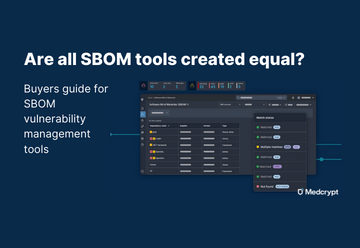November 15, 2023

By Nick Atwell and Felix Adusei, Medcrypt PKI Architects
As humans journey deeper into the digital age, we find ourselves increasingly reliant on the ubiquity of digital certificates. Much like the passports we carry on international flights, these digital certificates authenticate devices in an interconnected world and orchestrate trusted, secure, and encrypted communications. Digital Certificates help ensure that when we visit Amazon.com, it’s truly Amazon.com and not an imposter website. But nowhere is the role of digital certificates more pivotal than within the realm of healthcare, where they cease to be mere facilitators of connectivity and transform into essential guardians of patient safety and data privacy.
Imagine, for a moment, a connected insulin pump — a lifeline for an individual managing their diabetes. Should the digital certificate of such a device expire or not be trusted, it triggers a breakdown in the trusted communication process. This breakdown occurs because these certificates serve as the digital equivalent of a handshake between devices and systems. When a certificate expires or is no longer trusted, it’s akin to the system not recognizing the handshake, causing a loss of trust in the device’s identity, data, and functionality. This, in turn, leads to the suspension of vital health data transmission or even the disruption of the device’s operation.
Similarly, if a hospital’s Electronic Health Record (EHR) system suffers from an expired or untrusted certificate, it creates a barrier to data access and transmission. The result is erosion of trust, preventing healthcare providers from accessing or updating indispensable patient records. This, in essence, jeopardizes timely and appropriate care, due to the trust in the integrity and security of digital communication being compromised.
Beyond the immediate impacts on patient safety and data privacy, digital certificate management interlaces intimately with healthcare regulations. These regulatory frameworks are in place to protect patients’ privacy and safety. Inadequate certificate management may result in punitive consequences, revenue loss due to device malfunction and, more critically, impact the quality of patient care.
Certificate management in healthcare introduces distinct challenges, where the expiration of a certificate can disrupt data flow with potentially life-threatening consequences. For instance, imagine an insulin pump relying on an expired certificate; this could lead to delays in delivering insulin doses, resulting in uncontrolled blood sugar levels and severe health complications for the patient, including diabetic ketoacidosis, a potentially life-threatening condition. Medical devices like insulin pumps often lack continuous connectivity, making timely certificate renewal more difficult to manage to ensure uninterrupted patient care. Additionally, healthcare systems involve numerous interconnected devices, each with its own certificate, requiring meticulous management and compliance with evolving regulations. It also requires careful design decisions by the device manufacturers to determine how the device should behave in case of certificate expiration — and, depending on device type and use case, the desired behavior may range from discontinuing operations over resuming in a fail safe mode to resuming with the last known valid setting, to name a few examples.
As healthcare continues its digital odyssey, connected medical devices like connected insulin pumps have become increasingly common. Their increasing prevalence underscores the compelling need for effective certificate management. Their growing presence not only emphasizes this need but also highlights the profound consequences of mismanagement, from disruptions in patient care to potential regulatory violations. As of September, the FDA has updated the Cybersecurity in Medical Devices: Quality System Considerations and Content of Premarket Submissions guidance to include detailed recommendations for medical device manufacturers. Among these, the agency advocates for the use of modern cryptography standards, specifically FIPS 140–3, and underscores the critical importance of ensuring that a compromise in one device doesn’t expose the cryptographic keys of others.
Herein lies the value of automation. When dealing with vast arrays of devices, each requiring stringent security measures, manual management becomes unwieldy. Automation ensures that each device adheres to the FDA’s guidelines effortlessly. Automated systems provide diligent monitoring and timely renewal of certificates, directly addressing the potential risks highlighted by the FDA. Such systems enhance efficiency, reduce the possibility of human error, and streamline regulatory compliance, as healthcare institutions can furnish proof of up-to-date certificate management with ease. In essence, the integration of automation not only bolsters patient safety but also optimizes resource utilization, reinforcing trust in the rapidly evolving digital healthcare environment.
At Medcrypt, we understand the critical role medical devices play in the healthcare system. Ensuring devices are designed, built and operated with security at the core is our mission. We recognize the need to ensure the seamless delivery of quality care, acknowledging that it’s not just about protecting information but also facilitating uninterrupted patient care, all while upholding patient safety and privacy. That’s why we are dedicated to providing automated certificate management solutions while also offering our PKI infrastructure and service offerings. By embracing industry trends and innovative approaches, such as automation, we strive to fortify your digital infrastructure, reducing the risk of disruptions and enhancing overall efficiency. Our expert team ensures that your certificate management meets the medical device use case needs and aligns with the highest standards, empowering you to uphold patient safety, data privacy, and human dignity in the interconnected healthcare ecosystem.
For more on how Medcrypt can support your organization’s cybersecurity needs, visit us at medcyrpt.com and contact us at info@medcrypt.com to get started.
.png)

May 1, 2024

April 24, 2024


April 11, 2024
Get the latest healthcare cybersecurity news right in your inbox.
We'll never spam you or sell your information

